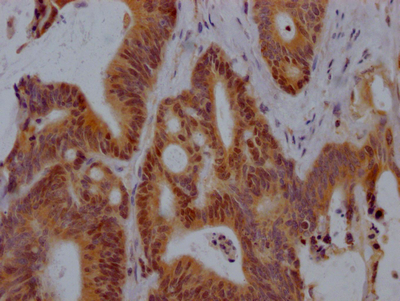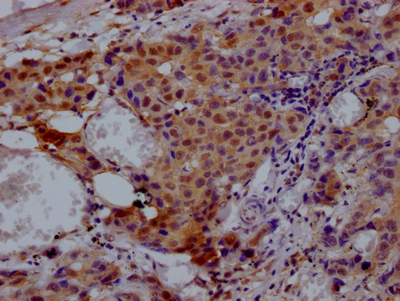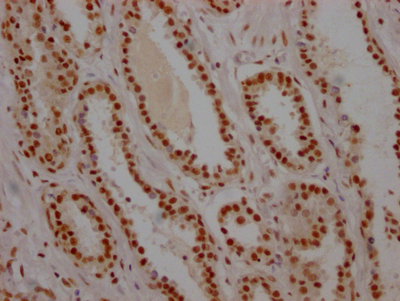TNFRSF4 Antibody
-
货号:CSB-PA006263
-
规格:¥880
-
图片:
-
其他:
产品详情
-
Uniprot No.:P43489
-
基因名:
-
别名:TNFRSF4; TXGP1L; Tumor necrosis factor receptor superfamily member 4; ACT35 antigen; OX40L receptor; TAX transcriptionally-activated glycoprotein 1 receptor; CD antigen CD134
-
宿主:Rabbit
-
反应种属:Human
-
免疫原:Synthesized peptide derived from the Internal region of Human Ox40.
-
免疫原种属:Homo sapiens (Human)
-
标记方式:Non-conjugated
-
抗体亚型:IgG
-
纯化方式:The antibody was affinity-purified from rabbit antiserum by affinity-chromatography using epitope-specific immunogen.
-
浓度:It differs from different batches. Please contact us to confirm it.
-
保存缓冲液:Liquid in PBS containing 50% glycerol, 0.5% BSA and 0.02% sodium azide.
-
产品提供形式:Liquid
-
应用范围:WB, ELISA
-
推荐稀释比:
Application Recommended Dilution WB 1:500-1:2000 ELISA 1:10000 -
Protocols:
-
储存条件:Upon receipt, store at -20°C or -80°C. Avoid repeated freeze.
-
货期:Basically, we can dispatch the products out in 1-3 working days after receiving your orders. Delivery time maybe differs from different purchasing way or location, please kindly consult your local distributors for specific delivery time.
相关产品
靶点详情
-
功能:Receptor for TNFSF4/OX40L/GP34. Is a costimulatory molecule implicated in long-term T-cell immunity.; (Microbial infection) Acts as a receptor for human herpesvirus 6B/HHV-6B.
-
基因功能参考文献:
- High OX40 expression in Ovarian carcinoma is correlated with chemosensitivity and improved recurrence free survival in Ovarian carcinoma . Patients might therefore benefit from a second line therapy. PMID: 29661166
- Increased OX40 expression is associated with gastric cancer. PMID: 29529339
- this study demonstrates that cSCCs contain an abundance of Tregs which can suppress tumoral effector T cell function and that activation of the costimulatory receptor OX40 enhances tumoral T cell responses. PMID: 27034329
- OX40 expression on T cells was positively associated with obesity in humans. PMID: 28612217
- Metabolically active CD4+ T cells expressing Glut1 and OX40 preferentially harbor HIV during in vitro infection. PMID: 28892135
- this study investigated whether CD134 is preferentially expressed on CD4 T cells in drug-induced hypersensitivity syndrome . PMID: 27174092
- blocking of both OX-40L and 4-1BBL reversed radiation-enhanced T-cell killing of human tumor targets as well as T-cell survival and activation. PMID: 26872462
- Low OX40 expression is associated with colorectal cancer. PMID: 26439988
- OX40 and its ligand are co stimulators for T lymphocytes. PMID: 26755473
- These studies provide the first direct evidence that ligation of tumour necrosis factor superfamily members and their cognate receptors is important for the control of viral lytic replication. PMID: 26467721
- Malaria patients and Plasmodium-infected rodents exhibit enhanced expression of the co-stimulatory receptor OX40 on CD4 T cells, which is abrogated following coordinate PD-1 co-inhibitory pathways, which are also upregulated during malaria. PMID: 25891357
- Identified two key amino acid residues within CD134 that are required for its interaction with herpesvirus 6B (HHV-6B) and for HHV-6B entry into cells. One of the residues (K79) allows access of the HHV-6B ligand to CD134. PMID: 26202244
- TL1A increases expression of CD25, LFA-1, CD134 and CD154, and induces IL-22 and GM-CSF production from effector CD4 T-cells PMID: 25148371
- High expression of OX40 is associated with type 1 diabetes. PMID: 24797972
- A cysteine-rich domain of CD134 that is critical for binding to the HHV-6B glycoprotein gH/gL/gQ1/gQ2 complex and HHV-6B infection. PMID: 25008928
- cirrhotic and hepatocellular carcinoma fragments moderately and highly infiltrated by Tregs, respectively, expressing OX40 PMID: 24756990
- data show that Ag-specific CD4(+) CD25(+) CD134(+) CD39(+) T cells are highly enriched for Treg cells, form a large component of recall responses and maintain a Treg-cell-like phenotype upon in vitro expansion. PMID: 24752698
- expression is associated with breast cancer in a stage dependent manner PMID: 23502335
- OX40 signals regulate CD8 T cell survival at least in part through maintaining expression of the anti-apoptotic molecule A1 PMID: 23936461
- Hyperactivation of the Akt pathway in Teff cells from children with lupus nephritis is associated with reduced induction of TRAF6 and up-regulation of OX40, which may cause Teff cell resistance to Treg cell-mediated suppression. PMID: 23896866
- This study identified OX40 as a key molecule and biomarker for rapid progression of HTLV-1-associated myelopathy/tropical spastic paraparesis. PMID: 23651542
- CD134 is a cellular receptor specific for human herpesvirus-6B entry. PMID: 23674671
- Head and neck cancer patients have decreased levels of alternative co-stimulatory receptors OX40 and 4-1BB. PMID: 22204816
- CD137 activity is directly proportional to colorectal cancer stage. Surgical resection of the tumor results in increased CD134 and CD137 expression PMID: 22343199
- We show that the inflammatory and cytotoxic function of CD4(+)CD28(null) T cells can be inhibited by blocking OX40 and 4-1BB costimulatory receptors. PMID: 22282196
- PAPP-A level was significantly related to soluble and membrane-bound OX40L in patients with ACS. PMID: 21111564
- Compared with control group, the expression of OX40 and Bcl-2 was significantly higher in allergic rhinitis. PMID: 19253527
- Transgenic OX40 forms a signaling complex in T cells that contains phosphoinositide 3-kinase (PI3K) and protein kinase B (PKB). PMID: 21289304
- High OX40 expression may be associated with malignant transformation, progression, invasion and metastasis in breast cancer biology. PMID: 20634005
- Possible proinflammatory effects of OX40L on the pathogenesis of atherosclerois. PMID: 21086790
- This study has shown that activation of OX40 induces CCL20 expression in the presence of antigen stimulation. PMID: 20400327
- The rs2298212G/A polymorphism in OX40 gene may be associated with the severity of coronary atherosclerotic disease. PMID: 20376799
- Data suggest the role of Perforin + cytotoxic T lymphocytes and CD134+ cells in the pathogenesis of autoimmunity of SLE. PMID: 20306696
- Pimecrolimus inhibits up-regulation of OX40 and synthesis of inflammatory cytokines upon secondary T cell activation by allogeneic dendritic cells. PMID: 12296857
- CD134 positive cells are identified within inflammatory lesions of active multiple sclerosis (MS), acute MS and chronic active MS as well as in acute disseminated leukoencephalitis patients. PMID: 14644025
- Mutagenesis showed that Asp60 and Asp62 are required for interaction with FIV, and modeling studies localized these two residues to the outer edge of domain 1 PMID: 15592478
- The expression of CD134 was markedly higher, compared to CD137, both on the day of the surgery and ten days after colorectal cancer surgery. PMID: 15638367
- Deficiencies in OX40 and CD30 signals were additive, secondary Ab responses were ablated.OX40/CD30 double-knockout OTII transgenic T cells fail to survive compared with normal T cells when cocultured with CD4(+)CD3(-) cells in vitro. PMID: 15778343
- Decrease in OX40 expression posttransplant includes the defective reconstitution of Treg cells, and the active inhibition of gene transcription by cyclosporine. PMID: 15808546
- stimulation of OX40/4-1BB rendered cells sensitive to apoptosis induced by TNF-alpha and reduced activation of NF-kappaB. OX40/4-1BB stimulation repressed the mitogen response in activated CD25+CD4+ T cells and preactivated CD8+ T cells PMID: 15941918
- CD3+ T lymphocytes co-expressing CD134 and CD137 antigens on peripheral blood revealed an increased percentages of OX-40/CD137 positive cells in patients with Graves' disease (p<0.025) compared to the controls. PMID: 16232366
- The relevance of these findings is supported by the vital functions fulfilled by OX40 in mammals as reflected by the high level of evolutionary conservation. PMID: 16329997
- The coexpression of CD25 and the costimulatory molecule CD134 on memory T-cells provides a novel marker for type 1 diabetes-associated T-cell immunity. PMID: 16380476
- OX40 ligation on CD4(+) T cells represents a potentially novel immunotherapeutic strategy that should be investigated to treat and prevent persistent virus infections, such as HIV-1 infection. PMID: 16456009
- OX40 is induced transiently on CD8(+) T cells upon activation and its signals contribute to both clonal expansion and functional reinforcement PMID: 16750861
- In the present study we found that costimulation via OX40 and TNF-R in OX40-expressing HIV-1-infected T cell lines leads to a marked reduction of HIV-1 production associated with rapid cell death. PMID: 18327975
- The expression of OX40 on CD4+ T cells in sentinel lymph nodes draining primary melanomas decreased withe more advanced tumor features, suggesting an immunosuppressive effect. PMID: 18374895
- Activity of OX40 ligand is enhanced by oligomerization and cell surface immobilization. PMID: 18397322
- the frequency of the most frequent haplotype, C-C-A-A, was significantly lower and that of the second most frequent, C-T-G-A, was significantly higher in hypertensive subjects than in controls. This difference was observed only in female patients PMID: 18398332
- These data offer a novel approach for UCB Treg expansion using aAPCs, including those coexpressing OX40L or 4-1BBL. PMID: 18645038
显示更多
收起更多
-
相关疾病:Immunodeficiency 16 (IMD16)
-
亚细胞定位:Membrane; Single-pass type I membrane protein.
-
数据库链接:
HGNC: 11918
OMIM: 600315
KEGG: hsa:7293
STRING: 9606.ENSP00000368538
UniGene: Hs.129780
Most popular with customers
-
Phospho-YAP1 (S127) Recombinant Monoclonal Antibody
Applications: ELISA, WB, IHC
Species Reactivity: Human
-
-
-
-
-
-
VCP Recombinant Monoclonal Antibody
Applications: ELISA, WB, IHC, IF, IP
Species Reactivity: Human, Rat
-





















